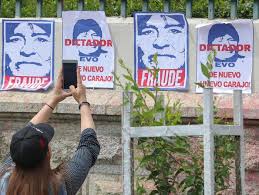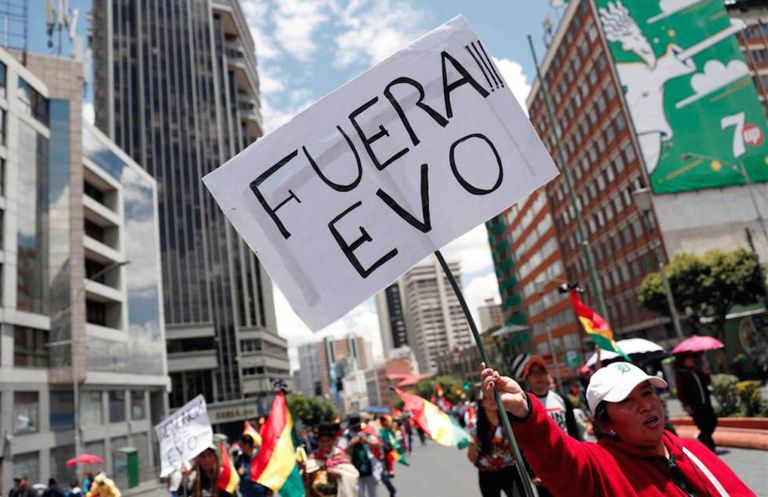RIO DE JANEIRO, BRAZIL – The joy of demonstrators in La Paz at the resignation of President Evo Morales lasted for a short time – on Sunday evening (local time) the festive mood turned into violence. Supporters of the ruling party Movimiento al Socialismo (MAS) marched through La Paz and, according to eyewitnesses, attacked people and buildings. According to Bolivian media, there were also lootings.
Among the targets of attacks were company buildings and the private homes of members of the opposition. Videos of the burning home of a university rector, who is considered the prominent voice of the opposition, were circulated on Twitter. The government supporters also attacked several media corporations, accusing them of anti-government reporting. The newspaper “Página Siete”, which is regarded as an independent source of information, announced on its website that it had temporarily suspended editorial operations for security reasons.

Violence also occurred in other cities. In Cochabamba, the country’s fourth largest city, groups of motorcyclists attacked people celebrating the president’s resignation in the streets. In Santa Cruz, the country’s largest city, the situation remained peaceful. Santa Cruz is regarded as the stronghold of the opposition.
Mutinous police officers
The violence in the streets of La Paz and other cities was favored by the fact that the police and army remained mostly in their barracks. The army announced on Sunday in a media release that it would carry out operations to “neutralize” armed groups attacking demonstrators. The extent of these actions has not been assessed at this time.
The police and the army’s stance over the past few days prompted Morales to resign after weeks of protests. Since Friday more and more police forces had mutinied and stood by the demonstrators demanding the government’s resignation. On Sunday evening, the army command had finally called for the resignation of Morales in order to restore peace in the country. The president and his vice-president Álvaro García Linera declared shortly afterwards that they would resign, on a video broadcast.
Events escalated on Sunday. First, a delegation from the Organization of American States (OAS) announced its report on the October 20th presidential election. It was harsh. Observers said there had been apparent manipulation and recommended that the ballot be repeated. Morales promptly reacted and announced new elections. He left it open whether he himself would run again.
Morales speaks of a coup
However, only a few hours later, Morales apparently realized that he had lost too much support to remain in power any longer. On Sunday, ministers and other officials resigned by the minute, including the presidents of both houses of parliament. Later that afternoon, Army Chief Williams Kaliman, appointed by Morales, declared that the president should resign for the good of Bolivia.
Morales read his resignation announcement shortly afterwards in the village of Chimoré near Cochabamba. The region, which is one of the coca production centers, is regarded as the government’s stronghold. Morales and Vice-President García Linera had fled La Paz with a small group of collaborators after it became clear that the army would no longer support the government.

In their resignation announcements, both Morales and García Linera described the events in the country as a coup. “The fight does not end here”, Morales said. “The impoverished, the social movements will continue this fight for equality and peace.” Whether Morales intends to stay in Bolivia or leave the country is unclear. Mexican Foreign Minister Marcelo Ebrard wrote on Sunday evening on Twitter that Mexico would grant Morales asylum should he seek protection. According to unconfirmed information, an arrest warrant has been issued against Morales.
Who is the president now?
After the president had announced his resignation, celebrations broke out in many parts of the country. In the centre of La Paz, demonstrators set off fireworks, waved national flags and sang the national anthem. In Santa Cruz, a stage was set up on which music groups played. Shortly afterwards, the attacks by government supporters broke out in La Paz and other towns.
The political future of Bolivia was at first completely unstable, as not only the president but also his vice-president and the presidents of both chambers of parliament had resigned. The vice president of the senate, opposition senator Jeanine Áñez, announced that she wanted to temporarily take over the presidency on Monday in order to organize new elections. However, it is doubtful that Áñez will be appointed by parliament as interim president. The ruling MAS party controls both chambers of the legislature.
The military will play an important role in the coming days. Should the army take action against the government supporters, this would support Morales and his allies’ argument that a military coup has taken place in Bolivia. Bolivia has a long history of such coups. During his reign, Morales always tried to maintain good relations with the army.
Morales was popular for a long time
The protests, which have now become Morales’ downfall and in which at least four people have been killed, began after the presidential election of October 20th. The electoral commission interrupted the announcement of the results when it became clear that Morales would not win in the first round. When the announcement was resumed 24 hours later, the authority announced Morales’ victory. The OAS monitoring delegation said on Sunday it was “statistically unlikely” that Morales had achieved the ten-percent lead over his opponent Carlos Mesa, required to win the first round.
Electoral officials were considered to be close to the government. On Sunday, the police announced the arrest of several officials, including its president.
Evo Morales was the longest ruling head of state in Latin America before his resignation. He has ruled Bolivia since 2006 and has long enjoyed widespread popularity. Above all, he was highly credited for strengthening the indigenous population of a country long ruled by a small European elite.
During his reign, however, Morales increasingly developed authoritarian traits, trampled the media and defied a referendum in which a majority of Bolivians opposed the lifting of the term limit. His downfall, which his supporters see as a coup of the old elites, should again widen gaps in the country.

